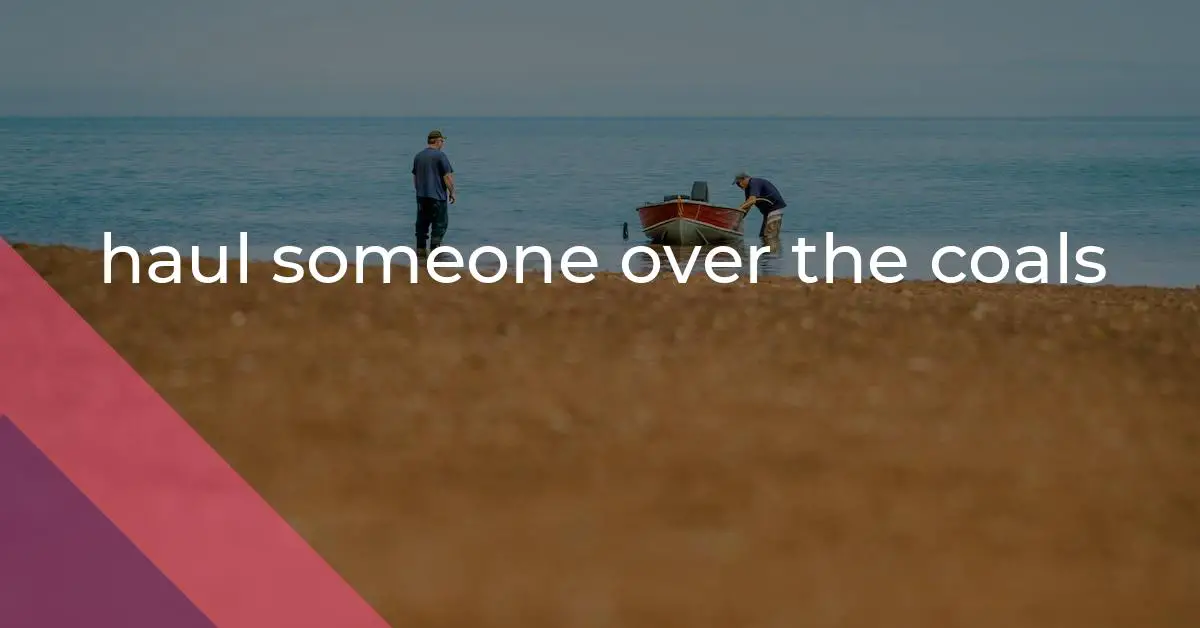haul someone over the coals: Idiom Meaning and Origin
What does ‘haul someone over the coals’ mean?
The idiom "haul someone over the coals" means to scold or reprimand someone severely for their actions or behavior.

Idiom Explorer
The idiom "rake over the coals" means to severely criticize or reprimand someone for their actions or mistakes, often with the intention of making them feel guilty or ashamed.
The idiom "hold someone's feet to the fire" means to put pressure on someone or hold them accountable for their actions or words.
The idiom "have someone's hide" means to punish or criticize someone severely. It expresses the idea of figuratively taking away or damaging someone's skin, as a form of retribution or discipline.
The idiom "go overboard" means to go to great or excessive lengths, often beyond what is necessary or reasonable. It implies an extreme or exaggerated action or behavior, often resulting from enthusiasm or excitement.
The idiom "give someone what-for" means to scold or punish someone severely for their actions or behavior. It implies giving someone a strong reprimand or retribution for their wrongdoings.
The idiom "give someone what for" means to scold or criticize someone severely, often in a forceful or angry manner.
The idiom "give someone the old heave-ho" means to dismiss or fire someone, typically from a job or position, often in a sudden or abrupt manner.
The idiom "give someone the business" means to scold or reprimand someone severely, often in an intimidating or forceful manner.
The idiom "give someone grief" means to continuously cause trouble or annoyance to someone, often by criticizing or complaining about their actions or behavior.
Scorching Origins
The idiom "haul someone over the coals" is a commonly used expression in English that means to reprimand or scold someone severely. It originated from the practice of putting individuals on trial by fire in medieval Europe. During this process, the accused would have to walk barefoot over hot coals, and the severity of their burns would be used as evidence of their guilt or innocence. Over time, the expression became a metaphorical representation of subjecting someone to a similarly intense experience of criticism or punishment.
This idiom is often used to describe the act of subjecting someone to a harsh and public reprimand or a thorough interrogation about their actions. It emphasizes the confrontational nature of the situation and is typically used in informal and conversational contexts. For example, a parent may haul their child over the coals for misbehaving, a boss may haul an employee over the coals for underperforming, or a teacher may haul a student over the coals for breaking the rules. The idiom effectively captures the emotional intensity and gravity of these confrontations.
Another related idiom is "rake over the coals." This expression means to rehash or revisit past events or issues, often with the intent of criticizing or blaming someone. Similar to "haul someone over the coals," it carries a sense of severity and seriousness. While "haul someone over the coals" is focused on confronting someone about their present actions, "rake over the coals" is more about digging up past mistakes or wrongdoings. It can be used in various contexts, such as in a heated argument or a postmortem analysis of a project.
A third related idiom is "hold someone's feet to the fire." This expression means to hold someone accountable for their actions or to put pressure on them to fulfill their responsibilities. It carries a similar sense of severity and emphasizes the importance of taking responsibility for one's actions. Like "haul someone over the coals," it implies an imbalance of power dynamics, with the speaker assuming a position of authority over the person being held accountable. This idiom can be used in various situations, such as in a workplace setting or during political debates.
The idiom "haul someone over the coals" originated from the practice of trial by fire in medieval Europe. It has evolved to become a metaphorical expression representing a severe and public reprimand or interrogation. This idiom is primarily used in informal contexts to convey disapproval or disappointment towards someone's actions. The related idioms "rake over the coals" and "hold someone's feet to the fire" carry similar meanings and emphasize the seriousness and accountability associated with confronting someone's actions or behavior.
Example usage
"After failing to complete the project on time, my boss hauled me over the coals and gave me a stern warning."
"The teacher hauled the students over the coals for not doing their homework."
"When I accidentally broke my sister's favorite vase, she hauled me over the coals and threatened to tell our parents."
More "Punishment" idioms



